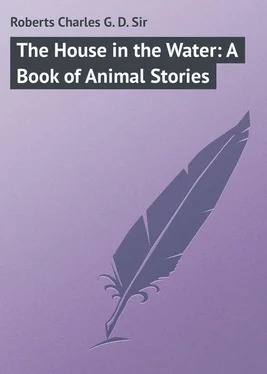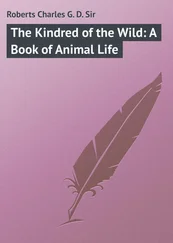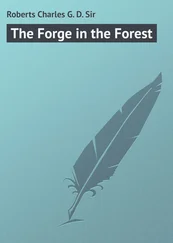Charles Roberts - The House in the Water - A Book of Animal Stories
Здесь есть возможность читать онлайн «Charles Roberts - The House in the Water - A Book of Animal Stories» — ознакомительный отрывок электронной книги совершенно бесплатно, а после прочтения отрывка купить полную версию. В некоторых случаях можно слушать аудио, скачать через торрент в формате fb2 и присутствует краткое содержание. Жанр: foreign_humor, Природа и животные, foreign_prose, Анекдоты, foreign_language, на английском языке. Описание произведения, (предисловие) а так же отзывы посетителей доступны на портале библиотеки ЛибКат.
- Название:The House in the Water: A Book of Animal Stories
- Автор:
- Жанр:
- Год:неизвестен
- ISBN:нет данных
- Рейтинг книги:5 / 5. Голосов: 1
-
Избранное:Добавить в избранное
- Отзывы:
-
Ваша оценка:
- 100
- 1
- 2
- 3
- 4
- 5
The House in the Water: A Book of Animal Stories: краткое содержание, описание и аннотация
Предлагаем к чтению аннотацию, описание, краткое содержание или предисловие (зависит от того, что написал сам автор книги «The House in the Water: A Book of Animal Stories»). Если вы не нашли необходимую информацию о книге — напишите в комментариях, мы постараемся отыскать её.
The House in the Water: A Book of Animal Stories — читать онлайн ознакомительный отрывок
Ниже представлен текст книги, разбитый по страницам. Система сохранения места последней прочитанной страницы, позволяет с удобством читать онлайн бесплатно книгу «The House in the Water: A Book of Animal Stories», без необходимости каждый раз заново искать на чём Вы остановились. Поставьте закладку, и сможете в любой момент перейти на страницу, на которой закончили чтение.
Интервал:
Закладка:
From this room the living, sleeping, and dining room of the beaver family, ran two passageways communicating with the outside world. Both of these were roofed over to a point well outside the walls of the house, and had their opening in the bottom of the pond, where the water was considerably more than three feet in depth. One of these passages was perfectly straight, about two feet in width, and built on a long, gradual slope. It was by this entrance that the house-dwellers were wont to bring in their food supplies, in the shape of sticks of green willow, birch and poplar. When these sticks were stripped clean of their bark, which was the beavers’ chief nourishment, they were then dragged out again, and floated down to be used in the repair of the dam. The other passage, especially adapted to quick exit in case of danger from the way of the roof, was about as spacious as the first, but much shorter and steeper. It was crooked, moreover,–for a reason doubtless adequate to the architects, but obscure to mere human observers. The exits of both passages were always in open water, no matter how fierce the frosts of the winter, how thick the armour of ice over the surface of the pond. In the neighbourhood of the house were springs bubbling up through the bottom, and keeping the temperature of the pond fairly uniform throughout the coldest weather, so that the ice, at worst, never attained a thickness of more than a foot and a half, even though in the bigger lakes of that region it might make to a depth of three feet and over.
While the wounded beaver lay in the chamber licking his honourable gashes, two other members of the family entered and approached him. In some simple but adequate speech it was conveyed to them that their presence was not required, and they retreated precipitately, taking different exits. One swam to the grassy edge of the islet, poked his head above water under the covert of some drooping weeds, listened motionless for some minutes, then wormed himself out among the long grasses and lay basking, hidden from all the world but the whirling hawk overhead. The other, of a more industrious mould, swam off toward the upper end of the pond where, as he knew, there was work to be done.
Still as was the surface of the pond, below the surface there was life and movement. Every little while the surface would be softly broken, and a tiny ripple would set out in widening circles toward the shore, starting from a small dark nose thrust up for a second. The casual observer would have said that these were fish rising for flies; but in fact it was the apprehensive beavers coming up to breathe, afraid to show themselves on account of the Boy. They were all sure that he had not really gone, but was in hiding somewhere, waiting to pounce upon them.
It was the inhabitants of the House in the Water who were moving about the pond, this retreat being occupied by their wounded and ill-humoured champion. The inhabitants of the other house, over on the shore, who had been interested but remote spectators through all the strange events of the morning, were now in comfortable seclusion, resting till it should be counted a safe time to go about their affairs. Some were sleeping, or gnawing on sappy willow sticks, in the spacious chamber of their house, while others were in the deeper and more secret retreats of their two burrows high up in the bank, connecting with the main house by roomy tunnels partly filled with water. The two families were quite independent of each other, except for their common interest in keeping the great dam in repair. In work upon the dam they acted not exactly in harmony but in amicable rivalry, all being watchful and all industrious.
In the under-water world of the beaver pond the light from the cloudless autumn sun was tawny gold, now still as crystal, now quivering over the bottom in sudden dancing meshes of fine shadow as some faint puff of air wrinkled the surface. When the dam was first built the pond had been of proper depth–from three to four feet–only in the channel of the stream; while all the rest was shallow, the old, marshy levels of the shore submerged to a depth of perhaps not more than twelve or fifteen inches. Gradually, however, the industrious dam-builders had dug away these shallows, using the material–grass, roots, clay, and stones–for the broadening and solidifying of the dam. The tough fibred masses of grass-roots, full of clay and almost indestructible, were just such material as they loved to work with, the ancient difficulty of making bricks without straw being well known to them. Over a large portion of the pond the bottom was now clean sand and mud, offering no obstacle to the transportation of cuttings to the houses or the dam.
The beavers, moving hither and thither through this glimmering golden underworld, swam with their powerful hind feet only, which drove them through the water like wedges. Their little forefeet, with flexible, almost handlike paws, were carried tucked up snugly under their chins, while their huge, broad, flat, hairless tails stuck straight out behind, ready to be used as a powerful screw in case of any sudden need. Presently two of the swimmers, apparently by chance, came upon the body of the beaver which the journeying otter had slain. They knew that it was contrary to the laws of the clan that any dead thing should be left in the pond to poison the waters in its decay. Without ceremony or sentiment they proceeded to drag their late comrade toward shore,–or rather to shove it ahead of them, only dragging when it got stuck against some stone or root. At the very edge of the pond, where the water was not more than eight or ten inches deep, they left it, to be thrust out and far up the bank after nightfall. They knew that some hungry night prowler would then take care of it for them.
Meanwhile an industriously inclined beaver had made his way to the very head of the pond. Here he entered a little ditch or canal which led off through a wild meadow in a perfectly straight line, toward a wooded slope some fifty yards or so from the pond. This ditch, which was perhaps two feet and a half deep and about the same in width, looked as if it had been dug by the hand of man. The materials taken from it had been thrown up along the brink, but not on one side only, as the human ditch-digger does it. The beavers had thrown it out on both sides. The ditch was of some age, however, so the wild grasses and weeds had completely covered the two parallel ridges and now leaned low over the water, partly hiding it. Under this screen the beaver came to the surface, and swam noiselessly with his head well up.
At the edge of the slope the canal turned sharply to the left, and ran in a gradual curve, skirting the upland. Here it was a piece of new work, raw and muddy, and the little ridges of fresh earth and roots along its brink were conspicuous. The beaver now went very cautiously, sniffing the air for any hint of peril. After winding along for some twenty or thirty yards, the new canal shoaled out to nothingness behind a screen of alder; and here, in a mess of mud and water, the beaver found one of his comrades hard at work. There was much of the new canal yet to do, and winter coming on.
The object of this new ditch was to tap a new food supply. The food trees near enough to the pond to be felled into it or rolled down to it had long ago been used. Then the straight canal across the meadow to the foot of the upland had opened up a new area, an area rich in birch and poplar. But trees can be rolled easily down-hill that cannot be dragged along an uneven side-hill; so, at last, it had become necessary to extend the canal parallel with the bottom of the slope. Working in this direction, every foot of new ditch brought a lot of new supplies within reach.
The extremity of the canal was dug on a slant, for greater ease in removing the material. Here the two beavers toiled side by side, working independently. With their teeth they cut the tough sod as cleanly as a digger’s spade could do it. With their fore paws they scraped up the soil–which was soft and easily worked–into sticky lumps, which they could hug under their chins and carry up the slope to be dumped upon the grass at the side. Every minute one or the other would stop, lift his brown head over the edge, peer about, and sniff, and listen, then fall to work again furiously, as if the whole future and fortune of the pond were hanging upon his toil. After a half-hour’s labour the canal was lengthened very perceptibly–fully six or eight inches–and as if by common consent the two brown excavators stopped to refresh themselves by nibbling at some succulent roots. While they were thus occupied, and apparently absorbed, from somewhere up the slope among the birch-trees came the faint sound of a snapping twig. In half a second the beavers had vanished noiselessly under water, down the canal, leaving but a swirl of muddy foam to mark their going.
Читать дальшеИнтервал:
Закладка:
Похожие книги на «The House in the Water: A Book of Animal Stories»
Представляем Вашему вниманию похожие книги на «The House in the Water: A Book of Animal Stories» списком для выбора. Мы отобрали схожую по названию и смыслу литературу в надежде предоставить читателям больше вариантов отыскать новые, интересные, ещё непрочитанные произведения.
Обсуждение, отзывы о книге «The House in the Water: A Book of Animal Stories» и просто собственные мнения читателей. Оставьте ваши комментарии, напишите, что Вы думаете о произведении, его смысле или главных героях. Укажите что конкретно понравилось, а что нет, и почему Вы так считаете.












